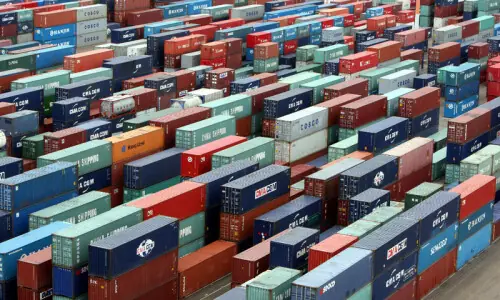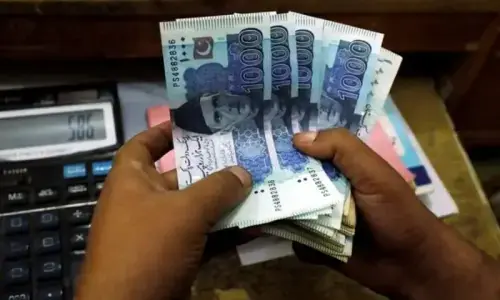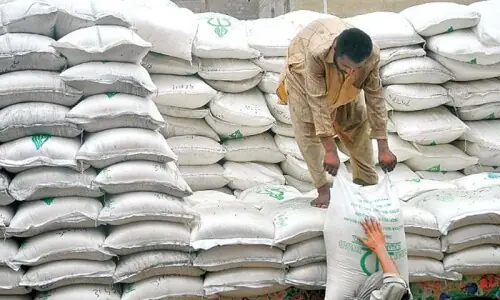
IN what has become somewhat of a ritual, Pakistan is back at the doorsteps of international creditors. The PML-N government has left national coffers empty, just like the PPP and the Musharraf-led PML-Q governments before it. Like clockwork, Pakistan goes to the IMF after every election: 2008, 2013 and now 2018. This time the request for financial assistance is expected to be the largest ever.
See: Is IMF avoidable?
The typical response of an incoming government has been to ‘plug the hole’ through IMF and kick the can down the road for another five years until the next near-death experience. However, for things to be different this time, the new government needs to respond differently. I highlight three elements here that should be part of the government’s strategy to get out this doom-loop.
First, strengthen Pakistan’s financial and regulatory authorities. Appoint competent and reputable leadership and design governance rules to minimise political interference. For example, the State Bank of Pakistan should be given legal and functional autonomy. The top leadership should be picked based purely on merit and appointed for a duration that is preferably as long as the political cycle of five years.
An independent regulatory authority, perhaps within the State Bank, should be empowered to monitor Pakistan’s exposure to risks such as leverage, liquidity and exchange rate risks in the financial sector. For example, when Pakistan agreed to take on the more than $50 billion in liabilities in exchange for CPEC, there should have been an independent analysis of the financial risks that such a commitment implied.
There are three crucial elements that should be part of the strategy to get out this doom-loop.
The benefits of having an independent and competent monetary authority are large. Markets reward a country with strong regulatory institutions with lower cost of funding, a stable currency and higher valuation. For example, when India moved towards making its monetary authority more independent and appointed competent individuals like Raghuram Rajan at the top, the Indian market rallied.
On the other hand, when President Erdogan challenged the independence of his own central bank, the Turkish lira plummeted. The lira depreciated further when Erdogan appointed his son-in-law as the finance minister. The new PTI government would do well if it could set a new tone for independence and competence within Pakistan’s financial institutions.
Second, shift Pakistan’s growth policy from the failed import-led strategies towards policies that focus squarely on raising domestic productivity growth and exports. Pakistan has relied too much on borrowed capital to fund large-scale capital expenditures. It is politically expedient to showcase ‘success’ by having a foreign country develop large capital projects on borrowed money. But at the end of every political cycle, the overhang of excessive borrowing ends up depressing the entire economy.
One of the most important lessons for students of economic growth is that a country’s long-term growth is almost exclusively a function of its domestic productivity growth. In plain words, a country cannot buy success from the outside, success has to be developed internally.
The new government needs to focus on factors that expand domestic productivity. For example, invest heavily in education so our labour force becomes more productive. From technology to market design and governance structures, there is now a wealth of information on what works in improving learning outcomes. Appoint competent people in top positions who can utilise this knowledge to run education policy.
Invest in science, technology and human capital infrastructure. Pakistan has a great shortage of producers of human capital, eg scientists and academics who can produce the next generation of skilled professionals. One of the government’s first orders of business should be to do everything it can to attract this top talent into Pakistan. This requires changing Pakistan’s narrative and promoting a pluralistic society. Today’s much sought-after global talent increasingly demands an open and free society.
The main reason for Pakistan’s perennial balance-of-payment crises is its anaemic export growth. For example, Pakistan’s exports did not increase in real terms over the last five years. Since 1980, Pakistan’s exports have grown at a rate that is only one-fifth that of India and Bangladesh. The new government must focus on expanding domestic productivity for Pakistan’s exports to rise.
Third, modernise the financial system in order to reduce the incidence of tax evasion and money laundering. Pakistan has one of the lowest tax collection rates that results in a high fiscal deficit. Pakistan also has an active black market in foreign exchange that siphons off ill-gotten wealth abroad. The black market facilitates tax evasion, further widening the fiscal deficit. It also increases the imbalance between the supply and demand for dollars. Both of these factors contribute to balance-of-payment problems in the long run.
The new government can reduce tax evasion and money laundering by moving the financial system towards a ‘cashless’ digital payment system that makes it easier to track and audit large financial transactions. The foreign exchange market should also be unified into a single market that integrates with the formal banking system. A combination of reputable leadership at the top and intelligent technology design can significantly reduce the incidence of tax evasion and money laundering.
For now, Pakistan is stuck in its old ways as the new government must plead to outsiders for a bailout. However, financial markets are forward-looking and operate on expectations. If the new government uses its first six months in power to signal real change along the lines above, market sentiment can change quickly.
Pakistan has tremendous potential. Once markets are convinced that those in power have the capacity to harness that potential, there will be no run on the rupee and no balance-of- payment worries. Let us hope that come next election time, there would be a ‘naya Pakistan’, where the departing government leaves behind a sound economic legacy.
The writer is professor of economics at Princeton University.
Twitter: @AtifRMian
Published in Dawn, August 17th, 2018






























